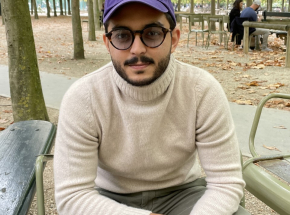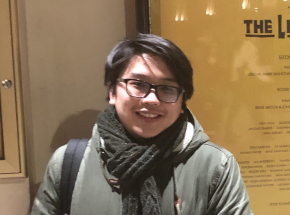- About AUP
- History of AUP
- Mission & Core Values
- Vision and Leadership
- AUP Recognition
- Alumni Success
- Campus Development
- Arts at AUP
- Policies & Guidelines
- Academics
- Undergraduate
- Graduate Programs
- MA in Diplomacy and International Law
- MA in Global Communications
- MSc in Human Rights and Data Science
- MA in International Affairs
- MA in International Affairs, Conflict Resolution, and Civil Society Development
- MSc in International Management
- MSc in Strategic Brand Management
- Find Your Thesis Advisor
- Previous Programs
- Cultural Program
- Faculty
- Summer School
- Research Centers
- The Center for Critical Democracy Studies
- Upcoming Events
- Research Projects
- Fellows’ Publications
- Publishing
- Curriculum
- Community
- Partnerships
- Visiting Scholars
- CCDS Highlights
- Atelier de Théorie Politique – Paris
- Critical Theory 101: Future Directions and New Challenges
- Martti Koskenniemi on “The Law of International Society: A Road not Taken”
- Academic Freedom Symposium
- Tocqueville Colloque 2023
- Violent Turns Conference
- Degenerations of Democracy
- DEMOS21 Inaugural Event
- What Demos for the 21st Century?
- The Paris Centennial Conference
- Justice Stephen Breyer
- Civic Jazz - The Launch of the Center
- Past Events
- FR
- The Center for Writers and Translators
- The George and Irina Schaeffer Center for the Study of Genocide, Human Rights and Conflict Prevention
- The Joy and Edward Frieman Environmental Science Center
- The Center for Media, Communication & Global Change
- The Center for Critical Democracy Studies
- Departments
- Academic Resources
- Academic Affairs
- Academic Calendar
- Academic Resource Center
- Library
- Registrar's Office
- Teaching and Learning Center
- Accessibility & Accommodation Services
- AI@AUP: A Campus-Level Initiative
- Quai D'Orsay Learning Commons
- Paris as Classroom
- ACE
- Admissions
- Student Life
- Campus
- Student Leadership & Involvement
- Paris
- Support Services
- Student Life Help Desk
- Student Accounting Services
- Student Immigration Services
- Student Grievance Procedure
- Diversity and Inclusion
- Health & Well-being
- Digital Student Handbook
- News
- Events
- AUP Giving
- Housing Offer for 2025-2026
- IT Services
- Alumni
- About AUP
- History of AUP
- Mission & Core Values
- Vision and Leadership
- AUP Recognition
- Alumni Success
- Campus Development
- Arts at AUP
- Policies & Guidelines
- Academics
- Undergraduate
- Graduate Programs
- MA in Diplomacy and International Law
- MA in Global Communications
- MSc in Human Rights and Data Science
- MA in International Affairs
- MA in International Affairs, Conflict Resolution, and Civil Society Development
- MSc in International Management
- MSc in Strategic Brand Management
- Find Your Thesis Advisor
- Previous Programs
- Cultural Program
- Faculty
- Summer School
- Research Centers
- The Center for Critical Democracy Studies
- Upcoming Events
- Research Projects
- Fellows’ Publications
- Publishing
- Curriculum
- Community
- Partnerships
- Visiting Scholars
- CCDS Highlights
- Atelier de Théorie Politique – Paris
- Critical Theory 101: Future Directions and New Challenges
- Martti Koskenniemi on “The Law of International Society: A Road not Taken”
- Academic Freedom Symposium
- Tocqueville Colloque 2023
- Violent Turns Conference
- Degenerations of Democracy
- DEMOS21 Inaugural Event
- What Demos for the 21st Century?
- The Paris Centennial Conference
- Justice Stephen Breyer
- Civic Jazz - The Launch of the Center
- Past Events
- FR
- The Center for Writers and Translators
- The George and Irina Schaeffer Center for the Study of Genocide, Human Rights and Conflict Prevention
- The Joy and Edward Frieman Environmental Science Center
- The Center for Media, Communication & Global Change
- The Center for Critical Democracy Studies
- Departments
- Academic Resources
- Academic Affairs
- Academic Calendar
- Academic Resource Center
- Library
- Registrar's Office
- Teaching and Learning Center
- Accessibility & Accommodation Services
- AI@AUP: A Campus-Level Initiative
- Quai D'Orsay Learning Commons
- Paris as Classroom
- ACE
- Admissions
- Student Life
- Campus
- Student Leadership & Involvement
- Paris
- Support Services
- Student Life Help Desk
- Student Accounting Services
- Student Immigration Services
- Student Grievance Procedure
- Diversity and Inclusion
- Health & Well-being
- Digital Student Handbook
- News
- Events
- AUP Giving
- Housing Offer for 2025-2026
- IT Services
- Alumni
Faculty
Professor Suprinyak
Department of Economics and Management
Professor Suprinyak
What is your research specialization?
I trained as an economist, from BA to PhD, but I specialize in historical scholarship. Broadly speaking, my research revolves around the history of political economy. Political economy is a big term that means different things to different people. I treat it as both a disciplinary field – an intellectual tradition dedicated to formulating abstract interpretations about how societies organize to satisfy their needs – and a space where this knowledge is brought to bear on political disputes about the proper rules and procedures for social provisioning. Under this big umbrella, my interests are diverse. I have published research on different historical contexts – early modern England, interwar Europe, Latin America during the Cold War – and touched on multiple topics, such as international trade, monetary theory, development economics, and policymaking.
What first brought you to AUP?
I worked for ten years as an economics professor in a large Brazilian public university. For personal reasons, I relocated to France in 2020 – right in the middle of the Covid-19 pandemic. AUP had an open position that was a great opportunity for me. One of the virtues of a small and flexible institution like AUP is that it is easier to make arrangements that are better suited to individual circumstances. Working in the anglophone, multicultural environment of AUP also made my transition to France much easier.
How would you describe your approach to teaching?
I have a deep respect for abstract, theoretical knowledge, and I try to communicate this attitude to my students. Even if theories may seem unrealistic and disconnected from reality at first – and economic theory can be especially vulnerable to such claims! – they still provide an organizational framework that helps us make sense of the confusion surrounding us. These frameworks are limited, but the answer can never be to dispense with theory altogether. We can’t abandon our ambition of arriving at a rational, encompassing understanding of reality, but true insight lies in the capacity to judge, in each case, what theory can or cannot explain. In my classes, I try to combine the importance of identifying the virtues of theoretical approaches with an understanding of the limitations of theory in making sense of complex real-world phenomena.
What do you think makes AUP unique?
The classroom environment at AUP is different from anything I’ve experienced before. The small groups make for an intimate, convivial atmosphere, where feedback from students is much more immediate. The sheer diversity of social and cultural backgrounds gathered in the same room has been challenging and rewarding. Interdisciplinary engagement with colleagues from other fields and departments has also come naturally – a healthy change of pace from the strict disciplinary boundaries that usually prevail in larger universities.
You can read more about Professor Suprinyak’s work on his faculty profile page. His history of economics podcast, “Smith and Marx Walk into a Bar,” is available online here.
Related
-

Ecological and Environmental Economics
Featured Course
Read MoreEcological and Environmental Economics
Featured Course
This course helps students understand how economic theory unpins environmental and ecological decision-making worldwide.
-
Tony Hung ’18
Alumnus
Read MoreTony Hung ’18
Alumnus
My advice to students would be to maximize your time with all the services AUP has to offer.
-

Shadi Ayoubi ’19
Alumnus
Read MoreShadi Ayoubi ’19
Alumnus
I encourage anyone looking to go into economics to make the most of the liberal arts program.

